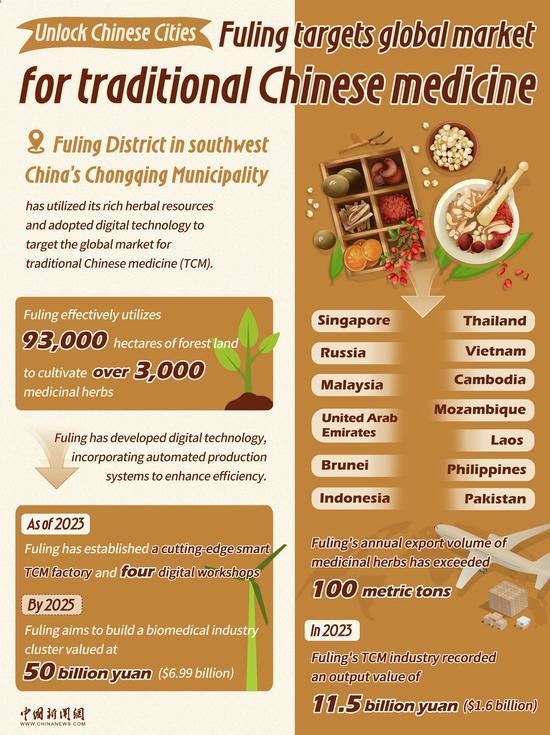The country has unveiled a plan for the overall layout of the country's digital development, vowing to make important progress in the construction of a "Digital China" by 2025. By 2035, China will be at the global forefront of digital development.
Jiang Xiaojuan, a professor at the University of Chinese Academy of Social Sciences, said data have permeated all aspects of society and have an impact on the allocation of social resources as well as the logic of economic and social operations.
Noting that China, the world's largest data producer, has unique advantages in accelerating the development of its digital economy, Jiang said it is of vital importance to give full play to the multiplier effects of data elements, create abundant applications in a wider range of sectors and promote the development and utilization of public data.
Statistics from the National Data Administration showed that China's total data output reached 32.85 zettabytes in 2023, up 22.4 percent year-on-year, while the added value of core digital economy industries accounted for 10 percent of GDP.
The top data governance regulator has unveiled a guideline to expand the application scenarios of data elements in 12 key fields such as industrial manufacturing, modern agriculture, trade circulation, transportation and financial services.
The country will create more than 300 typical application scenarios for data elements, double the scale of data transactions, and nurture a batch of data merchants with strong innovation capacities and third-party professional service organizations, according to the guideline.
"In the digital era, data elements have become a key and strategic resource driving economic growth. The in-depth integration of data with traditional industries will improve production efficiency, optimize the allocation of resources, and create novel business models and new social value," said Pan Helin, a member of the Expert Committee for Information and Communication Economy, which is under the Ministry of Industry and Information Technology.
For instance, enterprises can learn about market demand and consumer behavior more accurately through the analysis of large amounts of data, so as to optimize research and development, production and sale of products, Pan said.
Xu Ran, CEO of Chinese e-commerce giant JD, said the company has invested more than 100 billion yuan ($14 billion) in basic science and technology R&D since 2017, and is committed to enhancing the resilience and safety of supply chains by leveraging digital technologies.
Looking ahead, JD will speed up the transformation and upgrade of traditional industries, promote the in-depth integration of the digital economy with the real economy, and make efforts to build a modern industrial system, Xu said.
The revenue of China's digital economy reached 50.2 trillion yuan in 2022, ranking second in the world and equivalent to 41.5 percent of the country's GDP, according to a report released by the China Academy of Information and Communications Technology.
Ouyang Rihui, assistant dean of the China Center for Internet Economy Research at the Central University of Finance and Economics, said data are playing a pivotal part in promoting the transformation and upgrade of traditional industries, improving total factor productivity and giving birth to new industries, new models and new growth drivers.
Data have the attributes of commodities, which could be effectively allocated through market evaluation and trading, so as to create huge economic and social value, Ouyang noted.
He said more efforts are needed to promote the confirmation of data-related rights, explore a data pricing mechanism and value assessment system, and speed up the building of a unified domestic data elements market, in a bid to give full play to the value of data and boost the development of the country's digital economy.
The National Industrial Information Security Development Research Center said revenue derived from China's data elements market is projected to rise to 198.9 billion yuan in 2025, with the compound annual growth rate surpassing 25 percent during the 14th Five-Year Plan period (2021-25).
Wu Jianping, an academician at the Chinese Academy of Engineering, said the emergence of innovative digital technologies like 5G, artificial intelligence and internet of things has laid a solid foundation for unleashing the huge value of data elements, while underlining the significance of safeguarding data security, which is a prerequisite to ensure orderly development of the data elements market.
China aims to increase the size of its data security market to over 150 billion yuan by 2025, with a CAGR of more than 30 percent, according to a government guideline.
"New cybersecurity challenges have appeared along with the rapid development of AI technology and the accelerated application of data elements in more scenarios," said Qi Xiangdong, chairman of Chinese cybersecurity company Qi-Anxin Technology Group.
Qi said Qi-Anxin has rolled out a large language model targeting the cybersecurity industry to ensure the safe operation of networks, enhance cybersecurity response capabilities and fend off potential cyberattacks.
Qi said cybersecurity and AI are inextricably linked, while AI has greatly lowered the threshold of cyberattacks and raised some concerns about data leakage and malicious misuse of data. He said data security is more important than ever, and called for efforts to invest more in the training of high-caliber cybersecurity talent.


















































 京公网安备 11010202009201号
京公网安备 11010202009201号